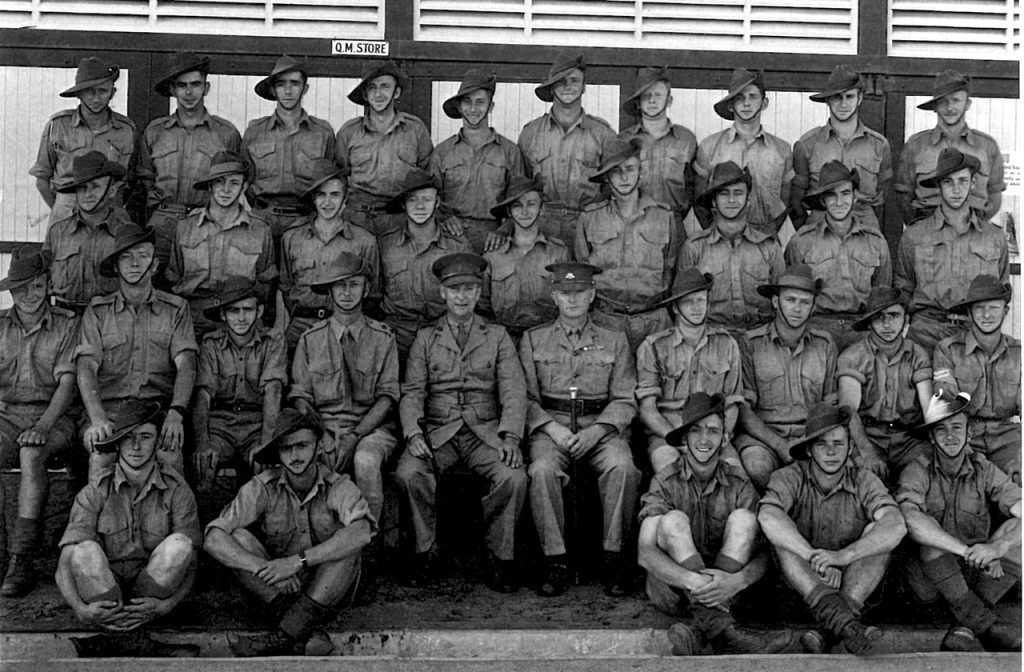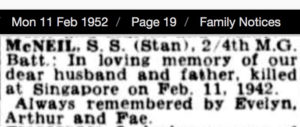The Soldier's Details

- Surname:
- McNeil
- First Name:
- Stanley Scott
- Nick Name:
- Stan
- Rank:
- Warrant Officer II (Promoted on 7.2.1942)
- Regimental #:
- WX15720
- Company:
- ‘E’ Company Headquarters, Special Reserve Battalion
- Enlisted:
- 13.08.1941
- DOB:
- 7.02.1900
- Place of Birth:
- Bootle, Liverpool, England
- Father's Name:
- Arthur McNeil
- Mothers's Name:
- Louisa McNeil
- Religion:
- Church of England
- Pre-war Occupation:
- Farmer
- Memorial:
- Epitaph, Singapore Memorial, Column 135, Age 42.
- Cause of Death:
- Killed in Action
- Place of Death:
- South-West Bukit Timah
- Date of Death:
- 11.02.1942
General Description
At the age of 16 years, Stan put his age up and enlisted in England in WWI. He was awarded Miltary Medal 4/11/1917 for ‘bravery in the field’.
WW1 CHESHIRE REGIMENT NO. 201075 – Stanley Scott MCNEIL During Egyptian Campaign against the Turks on 4 Nov 1917 McNeil volunteered with Private Greenwood who fired the gun whilst McNeil held up the enemy with bombs. When the operation was completed McNeil retrieved a Lewis gun that had been impossible to recover during the day owing to heavy enemy fire.
https://www.westernfrontassociation.com/world-war-i-articles/the-battle-of-mughar-ridge-one-soldiers-story/
Stan McNeil migrated to Australia in 1926.
When enlisting 31 Aug 1941 in Western Australia, Stan put his age down by 3 years. He had leased out his farm at Miling. He joined ‘E’ Company as a reinforcement. On 11 February 1942, ‘E’ Company ran into a Japanese ambush. About 88 of 200 survived. Sgt. Stan McNeil was 42 years old.







Above: L-R Sister Laura brothers William and Alfred (George) with their mother Louisa McNeil.
Stan was born Bootle Liverpool, third of four sons and one daughter to parents Arthur McNeil and Louisa Scott who married 1892 Lancashire. Two McNeil infants died. The 1911 Census records his father as Detective Police Sergeant, Bootle Municipal Corporation. Stan then aged about 11 and his older brother William Stuart McNeil, 16 years worked for Railways. William and second eldest brother Alfred (George) also enlisted WW1. Both survived to return home.
Youngest brother Alfred Scott McNeil, Clerk, 18 years, migrated to WA 1919 on ‘Beltana’. Alfred died in Perth 1988 having married Victoria May Walker and had a family.
In the 1925 Electoral Roll, Alfred and Stan McNeil were recorded working in the South West at Palgarrup. Alfred was timber worker and Stan a platelayer.
Today, the settlement is known as Palgarup. It is a small town situated between Yornup and Manjimup on the South Western Highway.
Younger sister Laura also moved to WA. She married in 1933 to Huntley Edward Lindsay and died Perth 1990.
Stan’s father Arthur McNeil died Bootle Feb 1912 aged 51 years. His mother Louisa died 1934 Liverpool aged 66 years. Louisa had given birth to seven children in twelve years. The youngest childen would have been Alfred 11 and Laura about 8 years. Stan would have been 12 years.
In 1931 Electoral Roll Stan is recorded farming at Miling.
Stan married Evelyn Seymour about 1933 Moora. Evelyn’s family farmed at Miling.
They had two children Arthur and Fae.









Battle of Megiddo
The Battle of Megiddo (19-25 September 1918) marked the beginning of the final British-led offensive in the Sinai and Palestine Campaign. It successfully combined cavalry, infantry, artillery, armoured vehicles and aircraft to achieve a decisive victory over the Ottoman Turks and their German allies. It was the start of a series of important Allied victories that ultimately led to the collapse of Ottoman Turkish forces and their eventual withdrawal from the war.
On 19 September the Egyptian Expeditionary Force (EEF), under the leadership of British Lieutenant-General Sir Edmund Allenby, launched an offensive against Ottoman forces in northern Palestine and the Jordan Valley. Allenby’s plan was to encircle Ottoman forces regrouping in the area around Megiddo and cut off their escape routes. A successful Allied deception campaign had convinced Ottoman forces that an Allied attack would come further east, leaving Ottoman defences in coastal Palestine vulnerable and ultimately outnumbered.
The offensive opened with an intense but brief artillery bombardment. British and Commonwealth forces quickly broke through the battered Ottoman lines with an advance of over 30km on the first day. The Desert Mounted Corps then quickly pushed through gaps in the defences to encircle the Ottoman troops. The Ottoman Eighth and Seventh Armies collapsed under the pressure of the Allied attack, surrendering in the tens of thousands.
Victory at Megiddo opened the way to Damascus, which Australian troops entered on 1 October. In the weeks that followed, the Allies captured other strategically important cities. On 30 October, the Ottoman Empire sought a peace settlement with the Allies and an armistice was signed at Mudros, with hostilities ceasing at 12 noon the following day. This was also after Turkish forces were defeated by Britain and its allies in Mesopotamia.




